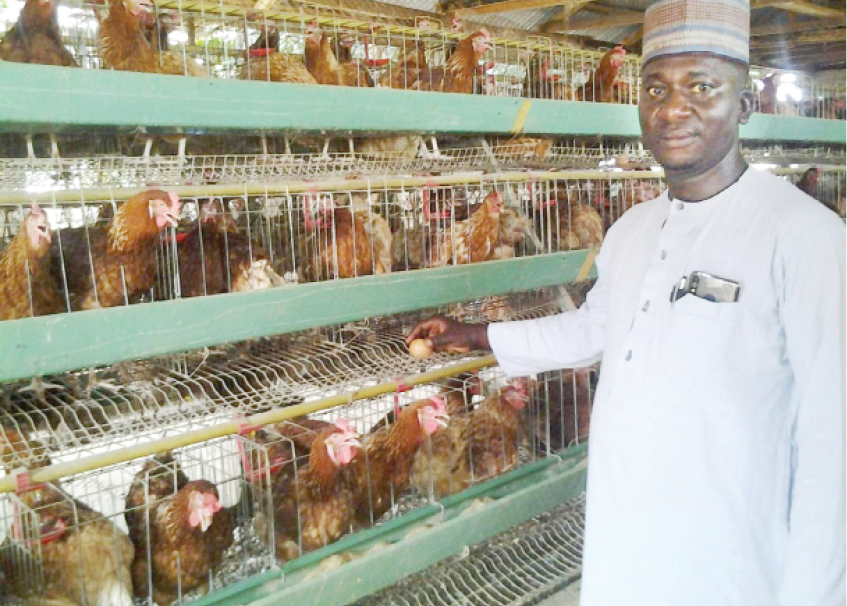About 30 per cent of poultry farmers in Kebbi State have been forced to abandon the business following the high cost of production as prices of chicks and feeds have gone up.
Prior to the new COVID-19 pandemic, poultry farming had been identified as one of the most thriving agri-business in the state as there were over 2000 poultry farmers, consisting of both smallholder and big-time farmers in the state capital, Birnin Kebbi, alone.
The ready-made market, particularly for those that rear the layer birds that produce eggs, created room for the business to accommodate as many farmers as possible.
But despite the availability of market for the poultry farmers in the state, hundreds of farmers were being forced out of the business due to increase in the prices of day-old chicks and feeds which made the business less lucrative particularly, for smallholder farmers.
Poultry farming is a business that requires sufficient capital that will enable the farmer to keep a steady supply of feed for one’s birds for a period of six and 21 weeks for broilers and layers.
When a farmer runs into insufficient capital, he is left with two options, either to cut the size of the population of the birds in the farm, which means less profit, or maintain the birds without adequate management, which also means little turnover as they may not gain the weight that would attract good price.
Farmers of broiler birds are the most hit because buyers are not ready to adjust to the current market realities as many of them, despite increase in the cost of day-old chicks and feeds, still want to buy the chickens at the prices four months ago.
The scarcity of the feed which originated from companies, also makes it difficult for smallholder farmers to maintain the poultry business.
Scarcity of maize, which is one of the major components for the feed formulation, brought about shortage of feed in the market, and for farmers that cannot afford to buy and stock in large quantity, they must abandon the business or risk running at a loss.
Speaking with Daily Trust on Sunday, one of the big time poultry farmers in the state, Abubakar Haliru Sarki of HKS Kebbi Pharmacy, said he had been in the poultry farming business for about 25 years, adding that he started when many did not consider poultry farming as a venture that could be a sustainable source for livelihood.
He said like many other beginners, he started with a backyard farm of 200 birds and that five years after, he expanded the business by opening a farmhouse.
Haliru stated also that at present, he has about 4,000 birds, all layers adding that plan is underway to also stock the farm with broilers.
According to him, in poultry farming, they used a parameter of what they called season, which aids them to determine the time for restocking. He said that is necessary because the species of birds each has its best time for marketing.
He said for broilers which are mainly for meat, they are best farmed ahead of festive periods and that by October he would stock his farm with broilers targetting the Christmas and New Year festivities.
He said the number of seasons for a poultry farmer depended on which part of the country one resided.
Haliru further revealed that the season for farming layers that produce eggs was largely when the temperature is relatively low saying, eggs enjoy high patronage at such season.
He said eggs have a large market in Kebbi State as any time one produced, there were ready buyers, adding that had given confidence to people to join the farming business.
Haliru noted that despite the good business climate, many farmers were forced to abandon poultry farming as a business as the cost of running the business kept increasing since the outbreak of the COVID-19 pandemic.
He said before the pandemic, farmers bought a day- old-broiler for N300 as against N510 now; while a bag of feed that used to cost N3000 is now N3700, adding that a bag fed only 200 birds a day.
For day old layers, they used to be sold at N200 but now cost N400. He said the biggest misgiving of the buyers was not appreciating the current market realities and accepting the new pricing.
“High cost of production without a corresponding increase in market prices of our product basically sent many poultry farmers parking from the business.
“There are over 2,000 poultry farmers in the metropolis but about 30 per cent have been forced to close shop. When one cannot even operate at breakeven, not even to talk of making a profit, such business must wind up. This is the current situation of poultry farmers in Kebbi State,” Haliru Sarki said.

 Join Daily Trust WhatsApp Community For Quick Access To News and Happenings Around You.
Join Daily Trust WhatsApp Community For Quick Access To News and Happenings Around You.

